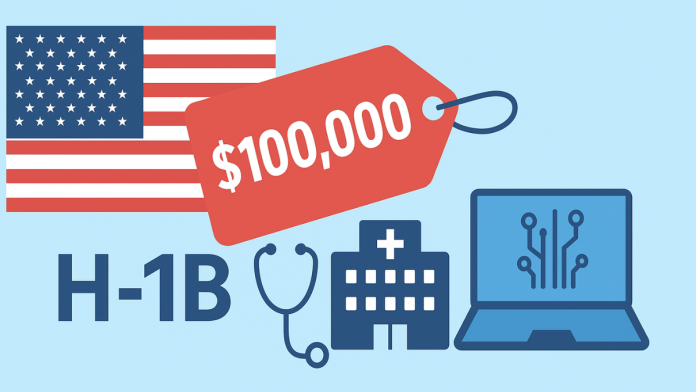The United States government has recently announced a new rule that adds a fee of $100,000 for every H-1B visa application. This visa program is often used by skilled foreign workers, especially in technology and medicine, to work in the country. The new charge has created strong reactions because it makes the process much more expensive for employers who depend on these workers.
The rule was signed by President Donald Trump on September 19 and applies only to new visa petitions filed from September 21 onward. Any applications submitted before this date will not be charged. Officials explained that the money collected from the fee will go to the US Treasury. They believe it will help reduce debt and possibly lower taxes. The government also said that the aim of this fee is to make sure only the “most skilled” people come through the program and to discourage misuse of the visa system.
However, the sudden announcement left many companies and workers worried. In India, which provides the majority of H-1B workers, people scrambled to make travel arrangements back to the US. Indian IT companies, including Infosys, Wipro, Cognizant, and Tata Consultancy Services, saw their stock values fall by 2 to 5 percent after the news. For them, paying such high charges for thousands of workers could cost billions.
Hospitals Warn of Shortages if Doctors Are Included
Hospitals and medical groups quickly raised alarms after hearing about the new fee. Many hospitals in the US rely on international doctors and medical residents, especially in rural and underserved areas. Without these professionals, millions of people could struggle to get timely medical care.
China lures Indian techies with new K visa as U.S. slams H-1B with $100,000 price tag
According to federal health data, more than 76 million Americans live in areas that are officially marked as short on primary care doctors. To fill these gaps, hospitals often bring in physicians from abroad through the H-1B program. Large medical institutions such as Mayo Clinic, Cleveland Clinic, and St. Jude Children’s Research Hospital sponsor hundreds of these visas every year.
The new fee would put a heavy financial burden on them. For example, Mayo Clinic alone holds more than 300 approved visas. A charge of $100,000 for each one could cost them hundreds of millions of dollars. Health leaders, including American Medical Association President Bobby Mukkamala, have said that such costs could make it nearly impossible to continue bringing in the international talent that the healthcare system depends on.
They also explained that foreign-trained doctors are not replacing American doctors. Instead, they usually serve in areas where it is very hard to attract US-trained professionals. Without them, small towns and rural regions could face even more severe shortages.
Possible Exemption for Physicians and Medical Residents
Following the outcry, the White House confirmed that the proclamation allows for case-by-case exemptions. White House spokesperson Taylor Rogers signaled that doctors and medical residents may be among the groups who could be spared from the $100,000 charge. A spokesperson clarified that healthcare workers could qualify for exemptions if their presence is considered vital to the country’s interests.
H-1B visa applicants will now face a $100,000 fee under new policy
This clarification comes as many medical professionals worry about the impact of the fee on patient care. They argue that limiting international medical graduates would harm communities that already face shortages. Hospitals across the country are now watching closely to see how the exemptions will be applied.
Meanwhile, the rule continues to affect other sectors. Technology companies, especially those in the IT services industry, are some of the biggest users of H-1B visas. Indian professionals make up about 71 percent of all holders of these visas. For the IT industry, this new fee could significantly increase costs and reduce opportunities for foreign workers.
Commerce Secretary Howard Lutnick defended the decision. He argued that past visa policies allowed too many workers earning below-average wages, which harmed American workers by lowering salaries and increasing competition. By introducing a large fee, he said only top-level talent will be able to apply.
The White House also expects the fee to generate more than $100 billion in revenue. Officials added that this money will support national financial goals while reshaping how foreign workers enter the country.
Even with these explanations, the announcement has caused unease. Both the healthcare and technology sectors now face uncertainty as they adjust to the new rules. For hospitals, the hope remains that doctors and residents will be formally exempt, ensuring that communities in need will continue to receive care.


